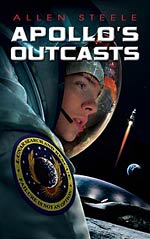
![]() Carl V.
Carl V.
12/4/2012
![]()
“On my sixteenth birthday, I went to the Moon.”
This isn’t the way it is supposed to be. Turning sixteen should be a special, memorable time for any teenager. It should be unforgettable. And for Jamey Barlowe, it was. In the early hours of the morning of his sixteenth year Jamey and his two older sisters are unceremoniously awoken by their father and rushed out of their home under cover of darkness. In the midst of the chaos and confusion the children are able to discover that the President of the United States is dead, an incident that is being reported as an assassination and the Vice President, Lina Shapar, is calling for the detainment of a group of American citizens that she believes may have a part to play in the President’s death, a group that includes Jamey Barlowe’s father.
Jamey Barlowe was born on the moon. As a result he suffers from a condition that has left him crippled for the majority of his life. If Jamey ever dreamed of returning to the place of his birth it was not like this. But for Jamey and the five other young people leaving with him, this isn’t a time for dreaming, it is a time for cold hard reality. Their destination is Apollo, a mining colony on the Moon, and although they are being sent their for their own protection they will soon discover that safety is all a matter of perspective and the Moon holds harsh challenges for each and every one of them.
Allen Steele’s young adult novel is being hailed as a successor to the great Robert A. Heinlein and if Steele did not pen this as a loving homage to Mr. Heinlein’s juvenile fiction then the only plausible explanation is that Steele is Heinlein reincarnated. From start to finish Apollo’s Outcasts reverberates with the heartbeat of Heinlein’s best and creates a contemporary sense of wonder that will have you daydreaming all over again about a future that includes human habitation on the Moon.
Robert A. Heinlein’s juvenile novels stand the test of time because they were written for young readers in a mature voice that held high expectations for the reader. They presented a fantastical future that did not seem all that fantastic because the sense of wonder they created was grounded in plausible scientific speculation. Those novels did not shy away from their attempts to educate young readers in a way that encouraged them to pursue an education that would allow for them to be an integral part of an amazing future that included a presence amongst the celestial bodies in our solar system. Allen Steele captures that same spirit in admirable fashion with Apollo’s Outcasts.
I won’t be coy with you, dear readers, I was smitten with this book from the start and that feeling of attachment grew at a steady pace all the way through to its final pages. Apollo’s Outcasts is lovingly crafted and it speaks to its intended audience with the dignity and respect that today’s young reader has come to expect from good fiction. At the close of the novel Steele acknowledges the many sources of inspiration for his creation of a mining colony on the moon that feels so plausible that adults who grew up gazing at the heavens with longing and anticipation will feel a genuine ache that this is not our present reality.
Apollo’s Outcasts follows Jamey Barlowe and a group of young people as they travel to the moon, learn to acclimate to an environment unlike anything they are used to, and discover that the Moon is a place where hard work and a community spirit are necessary for survival. It is also a novel that presents a very scary, equally plausible, political environment of social unrest and government abuse of power. The combination of these two major plot threads creates a tension that keeps the novel exciting while at the same time avoiding the cliche of non-stop action that sometimes taints the entertainment options offered today.
It can be argued that good science fiction contains good science and Allen Steele delivers on this account. By the same token I will argue that good science fiction contains good characterization and Steele populates Apollo’s Outcasts with a strong, engaging cast. He takes some risks, including a main character who is crippled and a side character who is mentally challenged, and he does not shy away from the fact that life involves tragedy as well as triumph. I certainly felt the full range of emotion while reading this novel and came out of the experience with a deep respect for Allen Steele’s talent as a storyteller and a warm glow from the knowledge that this style of science fiction can be made relevant for today’s audience. I have a list of adults and children a mile long that I would love to gift this book to. I can only hope that the book creates some of that same sense of wonder that Heinlein’s juvenile novels did in their era. Time will tell, but I cannot help crossing my fingers in hopes that this novel will be a success and will spawn similar efforts from Steele and others.
Effective young adult authors know their audience and walk that fine line between underestimating their audience and writing a novel for adults masquerading as a book for kids. Apollo’s Outcasts is a great example of doing it the right way. Steele packs a lot of information and adventure into 300 pages while practicing the kind of economy of words that will keep younger readers engaged. At the same time this is a book that I think adults will enjoy. I did, very much.
Apollo’s Outcasts is a winner. Solid storytelling, plausible scientific speculation, and emotionally satisfying characterization combine here for a stellar read. Buy it. Read it to your kids or read it to yourself. You will not be disappointed.
http://www.stainlesssteeldroppings.com